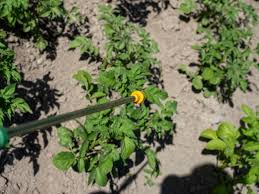Don Invent Insecticides With Plants, Edible Spices
Prof. AbdulRasak Musa of the Department of Crop Protection, University of Ilorin, Kwara State, North-Central, Nigeria has developed insecticide using locally available plants and edible materials such as spices.
Musa disclosed this on Friday in Ilorin while making his presentation at the 257th Inaugural Lecture of the University of Ilorin entitled “Managing Insects For Safe Food and Life.’’
He listed some of the spices as garlic, ginger, and African nutmeg and cloves.
According to him, plants are natural and renewable resources that are available to farmers and capable of purifying the environment.
“The use of locally available plants and edible materials, particularly spices, is effective in preservation against insect pests and extending the shelf life of stored food.
“An overall improvement in nutritional status of food and environment safety can, therefore, be achieved with management of insect pests using plant powder, plant extracts, and insect-resistant crops.”
The don said that garlic, ginger, African nutmeg, and cloves contained some compounds with insecticidal components.
He said that the spices had the potential to serve as an alternative to synthetic pesticides.
The expert submitted that powder and extract formulations of the spices were common and provided the best alternative to the use of pesticides.
Musa postulated that his research had shown that there was a possibility of using onion bulb and tobacco leaf extract against insects and boosting the yield components of cowpea in the field.
“Result revealed that cowpea treated with the plant extracts had significantly lower insect population than cowpea in the untreated plots.
“Tobacco leaf extract produced significantly heavier 100-seed weight than other treatments.
“It was found that plant extracts had potential to replace Cypermethrin by reducing insect population on cowpea and ensuring environmental safety,” he said.
Musa, therefore, advised Nigerian farmers and other stakeholders in the food system to acquire necessary pesticide education to incorporate the application of botanical insecticides in the management of insects for safe food and life
He also enjoined relevant government agencies to strengthen food safety legislation, monitoring and enforcement of maximum residue limits of pesticides on food items.
NAN/Shakirat Sadiq

